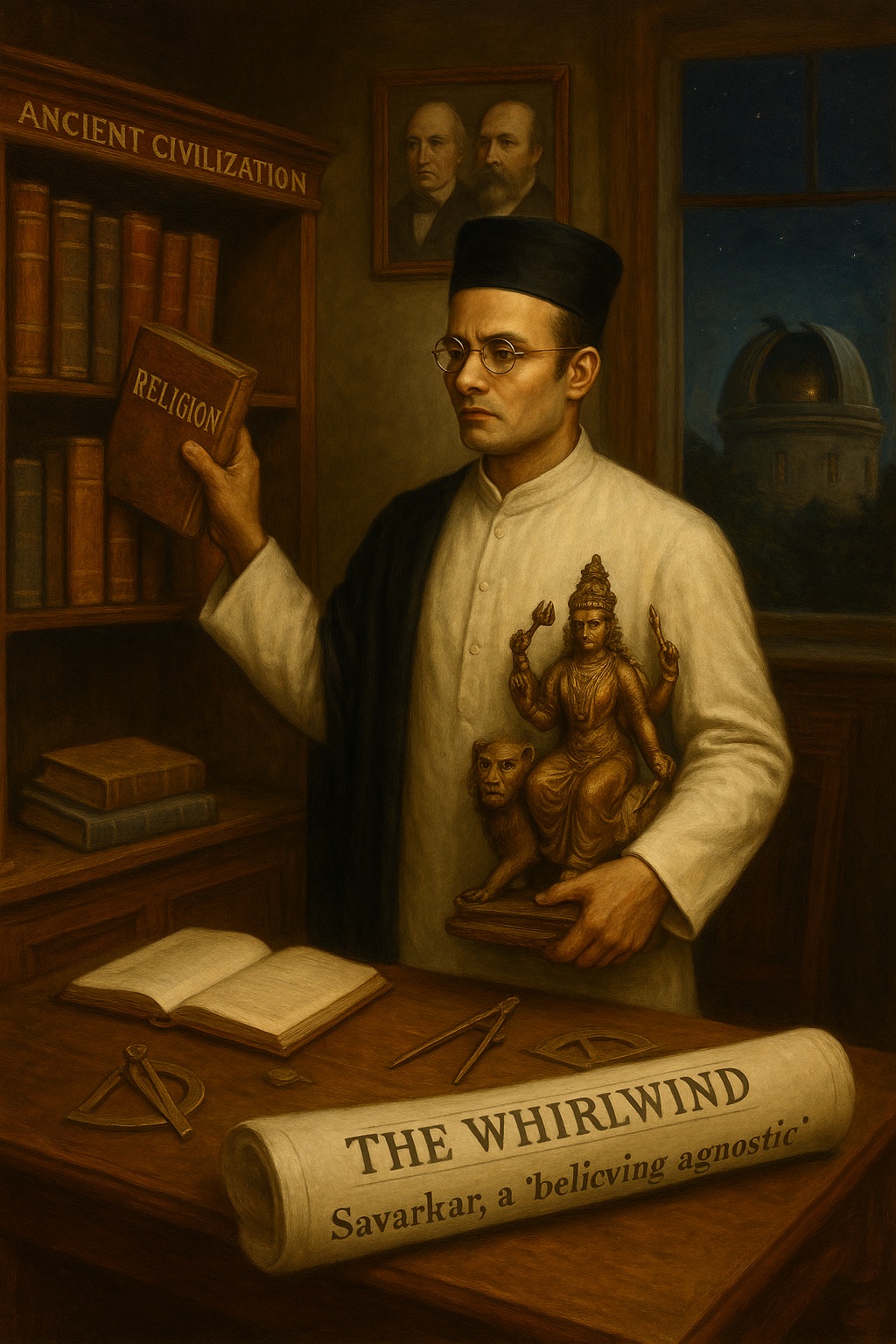Savarkar’s Philosophy & Worldview, Part 4; Savarkar’s Agnosticism (1/4)
Vinayak Damodar Savarkar remains one of the most complex figures in Indian history. Often remembered for his nationalist ideology, his views on religion were equally nuanced and thought-provoking. Neither a conventional religious man nor a staunch atheist, Savarkar’s approach to religion was one of rational scrutiny. He rejected blind faith but did not entirely dismiss the cultural and social significance of religious texts. His perspective on religion was deeply influenced by utilitarian thinkers like Jeremy Bentham and Herbert Spencer, leading scholars like Matthew Lederle to classify him as an agnostic, or more precisely, a “believing agnostic.”
Religion as a Human-Made Institution
For Savarkar, religious texts were neither immutable nor infallible. He pointed out the contradictions within religious scriptures, arguing that their inconsistencies proved they could not have been of divine origin. He suggested that rather than treating these texts as sacred and unquestionable, they should be regarded as historical documents that reflect the socio-political realities of their respective eras.
Savarkar believed that religious scriptures were not divine revelations but rather human creations that needed to be evaluated in the context of their time. He emphasized that these texts should not be considered the final word on morality or social structure. Instead, he argued that they were written by thinkers who formulated rules based on contemporary societal needs. As time progressed, these scriptures needed to be critically examined to determine their relevance in the modern world.
Rational Inquiry Over Blind Faith
Savarkar asserted that all religious principles should be subjected to rational investigation and scientific scrutiny. He believed that religious doctrines must be evaluated based on their practical utility rather than their historical sanctity. This pragmatic approach led him to conclude that while some elements of religious texts could be valuable, others had become obsolete and even harmful over time.
One of his most controversial yet logical arguments concerned the Manusmriti, a Hindu legal text. While recognizing that parts of it were outdated and discriminatory, Savarkar did not advocate for its complete rejection. Instead, he urged that only those aspects of the text that remained relevant and beneficial to society should be retained. His guiding principle was clear: while not everything found in the Manusmriti today is acceptable, that does not inherently make the text itself harmful or ridiculous. This approach extended to all religious texts—he encouraged people to extract wisdom where applicable but discard teachings that contradicted modern human values.
Religion in the Age of Reason
Savarkar saw science and technology as the true forces of progress. He criticized the tendency of religious followers to treat outdated texts as unchangeable laws. In his view, society should be built on secular and scientific principles rather than religious dogma. He believed that reforms should be guided by their practical benefits rather than religious sanction.
His radical stance was this: The sole criterion for evaluating reform or change should be its utility or harm in the present. This perspective led him to advocate for a complete departure from religious orthodoxy in favor of reason and empirical evidence.
A Historical and Sociological Perspective
Despite his critical stance on religious texts, Savarkar acknowledged their historical significance. He suggested that instead of treating them as divine commandments, they should be preserved as records of past civilizations. According to him, religious books served as “fossils” that provided insights into ancient socio-political structures and belief systems. He did not reject their study but cautioned against their blind acceptance.
Final Thoughts
Savarkar’s agnosticism was not a rejection of spirituality but an insistence on rationality. He did not advocate for the destruction of religious texts but for their careful scrutiny. His perspective was revolutionary in that it challenged the unquestionable authority of scriptures while acknowledging their historical and social importance. By advocating a rational, utility-based approach to religion, he sought to free Indian society from the constraints of dogma and usher in an era of scientific and secular progress.
His views remain relevant today, as societies across the world continue to grapple with the role of religion in modern life. Should we treat religious texts as immutable laws, or should we adapt them to contemporary needs? Savarkar’s response was clear: rational inquiry must take precedence over blind faith.
Sources:
DESHPANDE, Sudhakar. 1999. Savarkar. The Prophetic Voice. Dastane Ramchandra & Co.: Pune.
GODBOLE, Vasudev Shankar. 2004. Rationalism of Veer Savarkar. Itihas Patrika Prashan: Thane/Mumbai.
KETKAR, G. V. 1958. „Vira Savarkarance Dharmakarana“, in PADHYE, S. K. Savarkar Vividha Darsana. (Publisher: n.n.): Pune, 97-123.
LEDERLE, Matthew. 1976. Philosophical Trends in Modern Maharashtra. Popular Prakashan: Bombay (Mumbai).
SAVARKAR, Vinayak Damodar. 1950. The story of my transportation for life. Sadbhakti Publications: Bombay.
SHARMA, Suresh. 1996. „Savarkar’s Quest for a Modern Hindu Consolidation“, in Studies in Humanities and Social Sciences, Volume II, No. 2, 1996, 189-215, Shimla.


Leave a Reply